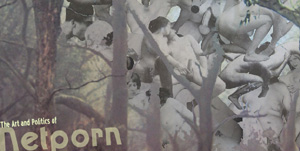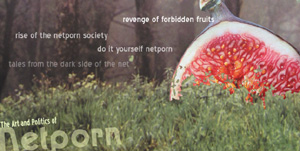Of Deep Throats and Shallow Thought (The Art and Politics of Netporn)
A new zone of media theory, netporn, revealed itself at this October’s The Art and Politics of Netporn conference in Amsterdam. Willing voyeur Sebastian Olma remained largely unaroused – except by the Italians, who were quite affecting.
Want to go to a conference on internet pornography in Amsterdam? Alright, stop twisting my arm! The Art and Politics of Netporn is organised by the Institute of Network Cultures in collaboration with Katrien Jacobs and Matteo Pasquinelli. Rather surprisingly, Franco 'Bifo' Berardi's is on the bill. Autonomia meets netporn – sounds rather interesting.

Mark Dery opened the event with the Burroughs-inspired announcement that Sex Organs Sprout Everywhere. What the US-based cyber theorist delivered as the first keynote can only be referred to as a porn-poem: a rhetorically brilliant exposé evolving around the central thesis that the neo-puritan Kulturkampf in the US is met – at least virtually - with an explosion of transgressive practice in the a-moral depths of the internet. Full-immersion baptism, as one could perhaps summarise the argument, finds its virtual other in bukkake (according to the wikipedia definition a ‘group sex practice wherein a series of men take turns ejaculating on a person [often a female]’). In an extremely entertaining sweep through the bukkake side of the dichotomy, Dery brought to the close attention of his audience the ever increasing boundaries of the sexual cosmos: babes in bathing caps, fanciers of underwater catfights, connoisseurs of submarine blowjobs, breath-holding fetishists, fans of simulated drowning, people who get off on showering in business suits, lactating transsexuals, scrotal inflation to mention just the tip of the, well, iceberg. What left one with a disappointing after-taste was that conceptually, all Dery had to offer was what he called the ‘Newtonian physics of contemporary society’, i.e., the thesis that for every repressive action of the dominant culture, there is an equal and opposite transgressive reaction from subcultures. One might have expected less leaning toward theoretical mechanics from the ‘leading cyber-critic of the United States’ (Geert Lovink).
The second and in sense complementary keynote came from psychoanalyst Mikita Brottman who ventured into an analysis of the Christian right’s paranoia regarding not only cyber-pornography but the internet as such. To the postmodern crusader, Brottman argued, the internet looks like the ‘portal to hell’ sucking in home-loving husbands and turning them into porn fiends or, even worse, leading innocent kids onto the playgrounds of paedophile predators. Bush-lovers (as in George, that is) thus see the internet as technological desecrator of previously immaculate minds. What makes this view so dangerous in Brottman’s assessment is that it defuses the ‘democratic potential of the internet’ by degrading it to yet another temptation to be conquered. The question might be asked, though, why anyone would expect otherwise from the puritan brethren in the US.
Most of the conference’s remainder is quickly summarised: an unintentionally hilarious (because extremely germano-academic) presentation on search engine statistics by Manuel Bonik, Ayah Bdeir (MIT) on spam, July Russo (Brown University) on how classical porn studies (sic!) are too orientated towards film studies, Rogerio Lira on his experiments in social nudity on Flickr.
Perhaps the climax of the day came with Sergio Messina, an independent musician, journalist and technology researcher based in Milan. His gig (a summary of which can be found at: http://www.daridire.net/realcore/) was a rough ride through the world of what he called realcore, i.e., a kind of people’s porn that circulates on Usenet newsgroups, Yahoo! clubs, Msn and so forth. As he claimed, there are 2 million images posted on these newgroups daily which, if it is true, contradicts the journal Nature’s (2002) findings according to which adult content websites make up as little as 2% of the internet (though obviously generating exponential amounts of traffic). Messina’s fantastic presentation, which was a sort of Rock’n’Roll version of Dery’s exploration into fetish-land, was only slightly weakened by the sheer absence of any awareness as to the highly problematic nature of his assertion that these private postings have a superior reality, showing the sexual acts or kinks of (the) people as they genuinely happen.

At this point one has learned quite a bit about what is out there, or rather, in there, i.e., on display in the promiscuous regions of netporn. There is, however, one nagging question: Where the fuck is Bifo?
Anticlimax: it transpires that Bifo has pulled out at the last minute. This is even more unfortunate as his essay, (perhaps programmatically entitled) The Obsession of the Vanishing Body, that circulated at the conference, could have set the tone for a productive engagement with the matter at hand. In this brief exposé, Bifo suggests a conceptualisation of pornography as index of what he refers to as the contemporary pathology of emotionality. In a sense, he applies the familiar Baudrillardian thesis of the implosion of the real to the phenomenon of netporn, arguing that the compulsively repetitive character of internet pornography reveals the general loss of connection between vision and emotion. As the perception of the image does not yield the desired result, the act of vision is ceaselessly repeated. The desiring body is thus put in a state of permanent electrocution that buries sexual imagination under the mass of repetitive acts of vision. ‘Stimul-hypertrophy’ becomes the instant substitution for emotional elaboration at the level of the body. What results is emotional atrophy.
This might, perhaps, sound a bit old-fashioned. However, it could have delivered a trigger for a debate conceptually on a par with the currents of contemporary theory. In fact, continental thought today does offer a rich and fertile arsenal of tools for critique and exploration of a phenonomenon like netporn. One might think of the renaissance of Bergson’s work on perception (an ontology of affective images acting on other affective images) whose intellectual mutations have quite productively begun to move media and art theory out of their structuralist deadlock. One could also imagine an interesting approach to netporn from the perspective of biopower/biopolitics, for instance in a problematisation of the formation/deformation of the flux of living desire in the smooth flow of internet imagery (and the corresponding economy).
There are of course a host of other theoretical potentialities. The fact that none of them really actualised might be attributed to the fact that this event was the ‘first conference on netporn criticism’. What saved it in the end were clearly the Italians. In terms of entertainment value, the above mentioned Sergio Messina proved absolutely priceless. Heuristically speaking, it was Matteo Pasquinelli (indymedia Italy and recombinant.org) and artist/designer David Boardman (only the name sounds English) who saved the day with their discussion of warporn which is generally understood as the mainstream media/government fascination with images of high-tech weaponry and the clean sci-fi display of the theatre of war. For Pasquinelli and Boardman, however, the choreography of warporn has substantially changed since the emergence of Abu Ghraib’s hardcore images. As they argued, those pictures have to be read as the American reaction to the images of 9-11 at the level of the global imaginary. For the first time a snuff movie was projected onto the screen of mainstream media to counter the blockbuster imagery of the WTC attacks. Its message is plain: ‘If you demolish our phallic icons we’ll fuck you even harder.’
Whatever one might think about this thesis, here was finally an attempt to approach the phenomenon of netporn. At last some theoretical penetration at the end of a day that was full of epiphenomenal petting. Mille grazie to the Italian delegation…
The Art and Politics of Netporn, De Badcuyp, Amsterdam, September 30-October 1 http://www.networkcultures.org/netporn/
Mute Books Orders
For Mute Books distribution contact Anagram Books
contact@anagrambooks.com
For online purchases visit anagrambooks.com






